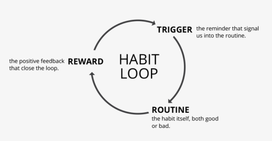Before I get into the down and dirty of how habits develop and how to purposefully develop a habit, I quickly want to address why I called that repetitive action of daily or weekly writing a writing practice and not merely a writing habit or writing schedule. The reason I chose practice is two-fold. One, writing is practice. We get better every time we write. We practice new styles, new tones, using new diction and syntax, new plot twists and character types. We change and grow every time we put a pen to paper or fingers on the keyboard. It's practice. The other reason I chose practice over habit is because I was modeling it after the idea of a yoga practice. While people with a solid yoga practice do perform yoga poses every day, they also practice the spiritual, meditative, and grounding aspects of yoga, not just the physical. In this way, I am hoping that writers who develop a writing practice approach their daily writing out of more than just rote, but also with wonder and excitement, at least most days. But if that's not possible, I'll take rote, and that gets us in to how to develop a habit of writing daily.
First, it is important to understand how habits form. According to NPR:

"Then there's the routine, which is the behavior itself," Duhigg tells Fresh Air's Terry Gross. "That's what we think about when we think about habits."
The third step, he says, is the reward: something that your brain likes that helps it remember the "habit loop" in the future.
1. Trigger: Sit down at your desk and turn on a writing playlist.
2. Routine: Write
3. Reward: Watch an episode of your favorite TV show
This is a simple format to follow, and that trigger could be enough, but if you need a stronger trigger you could add in a certain time of day. For example, come home from work, change into "home" clothes, grab a drink, and then go sit down at your desk and play that music. It makes it part of a bigger routine, which might make it easier to incorporate by tagging it on to the end of something you already do every day.
Still struggling? I did, too. Luckily, that same NPR article addresses when the best time to break an old habit or develop a new habit is. And apparently, that best time is while on vacation:
| "It's also a great reason why changing a habit on a vacation is one of the proven most-successful ways to do it," he says. "If you want to quit smoking, you should stop smoking while you're on a vacation — because all your old cues and all your old rewards aren't there anymore. So you have this ability to form a new pattern and hopefully be able to carry it over into your life." |
What a great reason to plan a vacation soon!
The last thing that needs to be considered when developing your writing habit is how long it will take before writing every day becomes routine rather than a struggle. You may have seen or heard that it takes 21, 28, or 30 days to develop a new habit or break an old. The idea that it takes a month or less to develop a habit is probably one of the most exciting things you've ever heard; but you may have also learned for yourself that developing a new habit is harder than that "fact" implies.
The reason you may have been finding habit development difficult is because this "fact" is not a fact at all. An article by The Huffington Post, which investigates the origin of the "21 Day Habit" myth, also exposes the fact that according to a 12-week-study of people trying to develop new habits, the average length of time it takes someone to develop a new habit is 66 days. That means you'll need to consistently perform your new task of writing for two months before it becomes routine, and perhaps even longer. Don't be disheartened, though! Missing a day won't affect your habit forming long-term, as long as you jump back on that habit-horse in the next day or two.
As an added bonus, the more you enjoy a task, the quicker that habit will develop. Think about how long it took you to fall into the habit of checking your phone throughout the day, or listening to your favorite podcast on the ride home, and you'll see that it took you far less than 66 days to develop those habits. So when you sit down at your desk to develop that habit of writing, embrace the act with joy, and you'll develop that habit faster.
I'd love to hear any thoughts you might have on writing practices or how to get into the habit of writing daily. If you have questions or something to share, please comment below.
 RSS Feed
RSS Feed